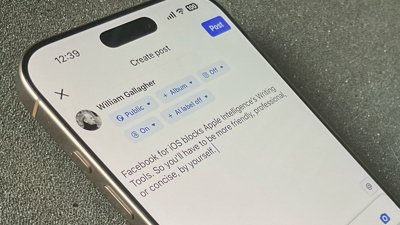A fellow Californian company, SpeakWare, on Thursday filed a lawsuit against Apple, accusing the iPhone maker of violating a U.S. voice control patent.
Apple is allegedly infringing on the patent — "Hands-Free, Voice-Operated Remote Control Transmitter" — by way of developing products that control accessories. These include iPhones, iPads, and the HomePod, as well as linking platforms, namely Siri and HomeKit.
The patent was awarded in 2002, and Apple has supposedly been aware of it since at least March 2014, when it was cited in a patent application. The company is in fact claimed to have cited it repeatedly, listing it as prior art in 46 patents and patent applications.
As compensation, SpeakWare is asking for damages with pre- and post-judgement interest, plus legal fees.
The firm appears to have little presence online, and is most likely a patent "troll" hoping to win an an out-of-court settlement. Apple is regularly targeted by similar lawsuits, many of which fail before reaching either settlement or trial.
There are exceptions. In April, for instance, Apple was ordered to pay VirnetX $502.6 million for supposed infringements in platforms like FaceTime and iMessage.
 Roger Fingas
Roger Fingas


 William Gallagher
William Gallagher

 Andrew O'Hara
Andrew O'Hara
 Wesley Hilliard
Wesley Hilliard

 Malcolm Owen
Malcolm Owen
 Marko Zivkovic
Marko Zivkovic




-m.jpg)




15 Comments
So I’m sure they will soon add google and amazon to this lawsuit...
Don't forget Samsung. I'm sure that Bixby would love to be invited to the party.
Typically, if your patent is cited as prior art in 46 of someone else’s patents, it’d be a fair bet they looked hard at your patent and either decided they aren’t infringing or they picked apart your claims and engineered their solutions to ensure they don’t infringe. It’s difficult to write a patent that prevents someone working around it by adding, deleting or modifying some part of the claimed invention, just enough to escape infringement.
Patents aren’t always about protecting inventions from infringement; they’re often about staking a claim in a space so that you don’t get sued for infringing someone else's patent. And I think that’s a fair use. It’s not such a noble pursuit when a non-practicing entity scopes out a piece of real estate in some new/emerging space for the express purpose of building a toll road there, charging any entity that intends to actually invent in that space something that would serve a market or society at large.